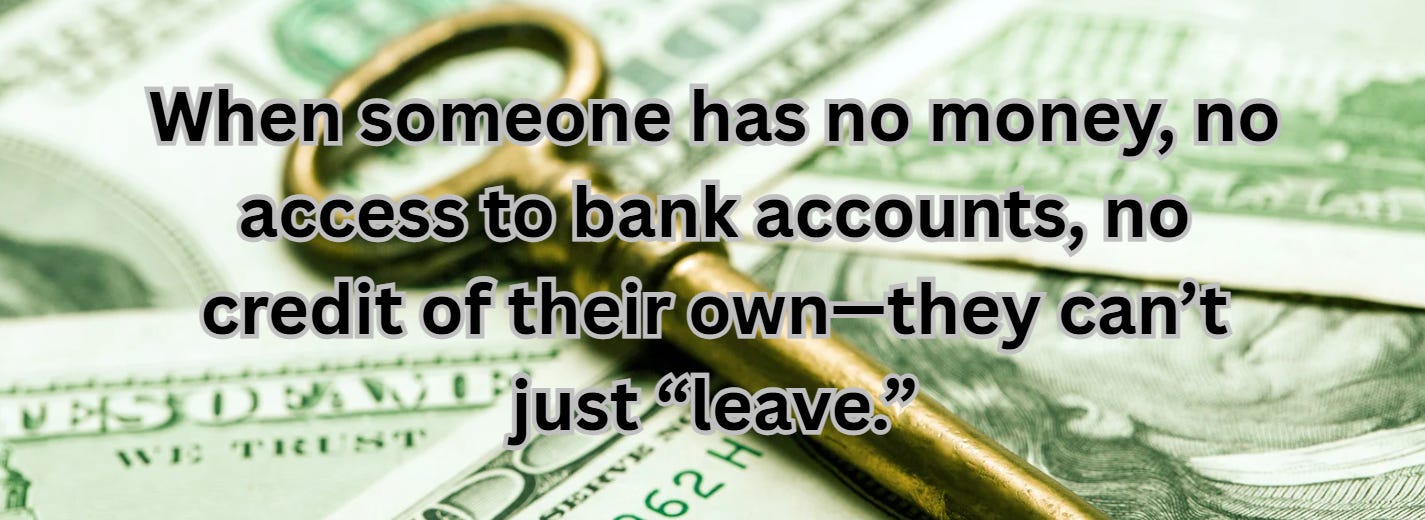Content Warning: This story contains references to emotional and physical abuse, trauma bonding, and financial control. For immediate help, call the National Domestic Violence Hotline at 1-800-799-SAFE (7233) or visit https://www.thehotline.org.
Joe’s Story: A Way Out, Finally
Joe stood in the doorway of Maria’s apartment holding his small dog. His shirt sleeves barely covered the claw marks on his arms. He wasn’t ready to talk about everything yet—but he knew he didn’t want to go back.
Maria didn’t ask a lot of questions. She just opened the door and said, “You can stay here.”
That simple gesture—an affordable room from a trusted friend—was all it took to start Joe toward a path out of the relationship that had been slowly destroying him.
The Invisible Chains: Trauma Bonding and Financial Abuse
Survivors of abuse don’t stay because they’re weak. They stay because they’ve been systematically manipulated, isolated, and disempowered. That’s the design.
Trauma bonding happens when an abuser alternates cruelty with kindness—threats one day, gifts the next. This creates deep confusion and emotional dependence. Survivors often hold onto the “good” moments, believing their abuser might change. That false hope becomes the hook.
Financial control makes things worse. When someone has no money, no access to bank accounts, no credit of their own—they can’t just “leave.” Abusers know this. That’s why they cut off resources: to eliminate options.
Together, these forces create a trap that feels impossible to escape. Joe wasn’t just dealing with emotional abuse—he was being held hostage by a system of control.
What Was Really Happening in Joe’s Life
Joe was married to a man we’ll call Sam. The abuse started with insults, then escalated to physical harm. But what made it hardest to leave wasn’t the violence—it was the lack of a way out.
Sam controlled everything:
The money
The bank accounts
The lease on their apartment
Even Joe’s access to friends and family
And when Joe threatened to leave? Sam would guilt him or threaten to hurt himself. Sometimes he’d suddenly turn sweet again, apologize, and make promises.
That’s emotional blackmail layered on top of trauma bonding. And it’s what kept Joe stuck—until Maria offered him something rare and powerful: a safe alternative.
🚩 Red Flags to Watch For
🚩 They control all the money and don’t give you access
🚩 They apologize after hurting you—but only to stop you from leaving
🚩 You feel like you can’t survive without them
🚩 They make you feel guilty for wanting space or independence
🚩 You feel more confused than safe after talking to them
🚩 You believe things will get better “if you just try harder”
✅ Green Checkmarks of Support
✅ They listen without pressuring you
✅ They offer real help—like a ride, a place to stay, or support finding resources
✅ They remind you it’s not your fault
✅ They help you feel capable again
✅ They talk to you like you’re strong, not broken
✅ They connect you with trained professionals
If You Need Help
You’re not alone—and you’re not crazy. Abuse is designed to make you feel both.
📞 National Domestic Violence Hotline
1-800-799-SAFE (7233) | https://www.thehotline.org
📍In Austin:
SAFE Alliance
Call 512-267-SAFE or visit https://www.safeaustin.org
Sometimes the first step to safety is someone saying, “You can stay here.”
If you can be that someone, be them. If you need that someone, we’re here.
About Beyond the Red Flags
Billy Joe and Jacqueline Cain are the passionate founders of Radical Empathy Education Foundation. Together, they are on a mission to educate the world about emotional abuse and abuse prevention through immersive experiences like TRAPPED: A VR Detective Story. Their goal is to empower individuals to recognize, prevent, and respond to these issues, saving lives along the way.
If you believe in this mission, you can support their work through Buy me a coffee or a donation to Radical Empathy Education Foundation.
About TRAPPED: A VR Detective Story
TRAPPED: A VR Detective Story provides users with an immersive, interactive experience that tells the story of Lisa, a 14-year-old trafficking victim. Through Lisa’s narrative, participants gain insight into the subtle yet powerful tactics predators use to manipulate and control their victims. This engaging VR experience has already reached over 15,000 participants across 10 states, serving as a critical resource for abuse prevention in schools, shelters, law enforcement, and corporations.

About Radical Empathy Education Foundation
Radical Empathy Education Foundation is a nonprofit organization dedicated to preventing abuse and human trafficking through innovative, immersive VR technology. Their award-winning training tools educate users on the tactics predators use and empower individuals to recognize and avoid abusive situations.
Learn more about Radical Empathy Education Foundation and connect to access their VR training at ArborXR’s XR Directory.








